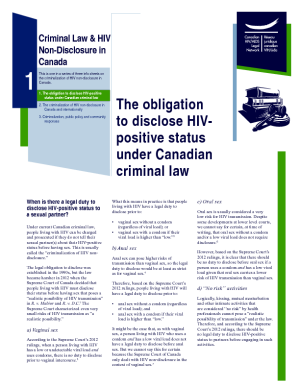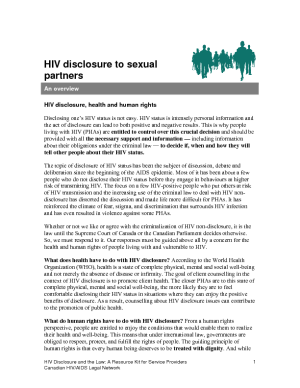Designed to help health and service providers to support PLHIV who are thinking about disclosing their HIV status, the guide provides commentary on obstacles to disclosure, personal biases and concerns for public safety. Also lists agencies providing support for service providers.
Makes HIV disclosure more difficult
Many people find it difficult to tell others that they have HIV because HIV remains a highly stigmatised condition. This section contains information about the many reasons people may not tell their sexual partners about their HIV status. It shows that there is nothing unusual or malicious about a person not disclosing their status before sex.
The obligation to disclose HIV-positive status under Canadian criminal law
Explains when there is a legal duty to disclose HIV-positive status to sexual partners, what can happen when a person doesn’t disclose, and what to do if a person is worried about being charged.
- Alternative links
- French / Français
The gender of lying: Feminist perspectives on the non-disclosure of HIV status
Arguing from a feminist perspective, this article contends that non-disclosure of HIV status to one’s sexual partner should not vitiate consent to sexual activity. Considers the gendered effect of lying, and how HIV status intersects with the power imbalance at the root of sexual assault. Discusses the tension between the need for women to protect both their medical information and their sexual integrity. Also considers the role of stigma in preventing disclosure.
HIV Disclosure to Sexual Partners: An Overview
Considers issues around disclosure of HIV status including human rights, ethical obligations to prevent transmission and the complexity of disclosure.
HIV disclosure without consent linked to increased risk of verbal and physical violence against women living with HIV in Metro Vancouver, British Columbia
Examines the prevalence and correlates of violence against women living with HIV due to HIV status in Metro Vancouver and examines the particular impact of non-voluntary HIV disclosure. Found that WLWH who had their HIV status disclosed without consent had 5-fold increased risk of experiencing HIV-related violence. Suggests that the criminalisation of HIV non-disclosure may contribute to and reproduce gender-based violence, and raises concern about stigma, discrimination, and women’s confidentiality rights.



